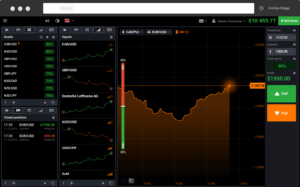Whose order flow is it anyway? – Candid discussion on retail binary options with Binarystation’s Greg Beliakov
Yesterday, Binary options platform provider Binarystation launched a new enterprise solution for the retail OTC binary options sector which is capitalized via a one-time fee from broker partners. The new system also provides the full source code of the platform to its commercial customers which can then adapt the platform to suit its own business […]

Yesterday, Binary options platform provider Binarystation launched a new enterprise solution for the retail OTC binary options sector which is capitalized via a one-time fee from broker partners.
The new system also provides the full source code of the platform to its commercial customers which can then adapt the platform to suit its own business requirements, emulating the direction taken by opensource FX platforms over recent years.
Today, FinanceFeeds spoke to Mr. Beliakov, at a time during which the OTC binary options industry has been under considerable scrutiny and is in a developmental phase in which it is now evolving, in order to gain full perspective as to the rationale behind elevating binary options platforms into the institutional sector.
Only now has the OTC binary options platform sector begun to emulate some of the sophisticated opensource platform in the retail FX sector, spearheaded by Spotware Systems cTrader in 2013 and subsequently taken up by some of the brokers with proprietary platforms. This is interesting because TRADOLOGIC and SpotOption went toward the gaming direction, Tradesmarter went social,whereas you are viewing binary options as the same category as retail FX in terms of sophistication. What are your views on this?
What we have seen with the binary options industry, and what spurred us to develop and release the Binarystation platform in 2014, was the blurred line between tech providers and brokers. This is in contrast to Forex, which has a clear distinction between the platform provider and the broker, because the broker is more or less independent of the platform provider in the way they conduct business. This is not the case in with many binary option platform providers, as they champion the “you do sales and marketing, we handle the rest” approach, and besides including technology, this also means they do the risk management.

In regards to binary options themselves, I feel that they are a very flexible and versatile instrument, and this is demonstrated by providers going in different directions. I firmly believe that they are a financial instrument and should be presented, and regulated as such.
An open source platform such as that provided by Binarystation would likely attract a high caliber of private trader, but could also be integrated into the product range of other firms, for example a local bank could become a white label partner and integrate the system into their own, putting the binary options accounts next to a current or savings account on a customer’s online banking portal. Do you see this as a way of elevating the level of customer base via technology away from gaming and casino-style shops to more mainstream?
We work on a licensing basis as opposed to white-labels. This is true to both our standard solution and the Enterprise solution which includes the source code.
The technology to do this we’ve been providing since we initially launched, however, binary options have a long way to go in terms of reputation, which has been muddied, and regulation, which is either lax or confusing, before binary options get to the local bank level. I believe in the future that binaries will get to that point. After all, Forex did in a sense, and that did not happen in one day.
As far as the customer base goes, binary option traders come from all walks of life. There are gamblers, there are those who wish to hedge their risks taken on other investment vehicles, beginners, and professionals. What the industry has demonstrated is that there is a huge demand for them. The simplicity found in binary options has a broad appeal within the mainstream, so I do believe that there is a chance of them going mainstream as the product itself gets more
With sophisticated traders and those who are interested in developing their own apps, whether private or corporate, comes a demand for a high quality trading environment. How easy is it to adapt binarystation to be able to connect to a dedicated binary options exchange such as Cantor Futures Exchange in America?
Our API is very flexible. Brokers have the ability to create their own front-ends with it, their own CRM, affiliate system, even backoffice accounting system. So adapting or connecting Binarystation to an exchange like Cantor is certainly possible, and certainly something we looked into already. Our priorities lie elsewhere though, especially for this year.
Do you expect to take onboard commercial partners at a greater rate than direct retail traders due to the opensource nature and one-off fee, therefore placing binary options within the realms of financial services companies that offer other investment products?
We work with registered companies, and do not plan to work with direct retail traders. That’s the point I am trying to get across, technology should be technology and brokerages should be brokerages.
As far as our clients go we have: holdings, investment banks, Forex brokers, and pure binary option brokers. Of course, we would like to see more diversity in the type of companies offering binary options, and are creating solutions that will fit their requirements.
Exchange traded binary options is where the prestige is, and OTC binary options has come under fire recently for less than salubrious practices. How will Binarystation’s more institutional platform move the industry away from that image?
The criticism towards the industry’s set norms and practices are not unfounded. This is something that not only drives away the retail traders, but also brokers who do not want to be associated with the muddy reputation that binary options carry. The binary options industry is a wild west industry right now, very much like Forex was and still is in some countries.
However, unlike Forex, much of the blame is shifted towards brokers and not the platform providers who directly profit from these practices. Forex is dominated by MetaQuotes, a pure technology provider, they do not trade and are not a brokerage and do not have conflicts of interest in that regard. Regardless of what a binary platform provider may say, if they control the brokers’ risk, they are operating more as a broker than a technology provider.
It’s also very easy and cheap to open a binary broker, and with most platform providers all you need to do is handle “sales” and marketing. An example of how this is handled has been recently published in articles by the Times of Israel, and you can find these same examples within complaints of traders.
This also means that if you decide to “run off” with the client money, you can just buy another white label and continue under another brand. There is a direct conflict of interest here, and I believe that platform providers do deserve a large portion of the blame. Very much like a bank would be held accountable if they laundered money for criminals and terrorists.
Our goal is to decentralize the industry away from the platform provider, and that is what would propel it forward. It is not a secret that brokers with well developed proprietary platforms (an example would be IQ Option) enjoy much greater success and reputation than brokers dependent on their technology provider. Both of our solutions allow brokers this level of independence at a fraction of the cost.
Photograph courtesy of Binarystation









